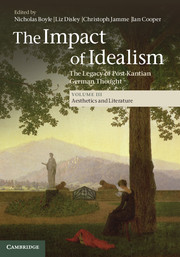Book contents
- Frontmatter
- Contents
- List of Illustrations
- List of Contributors
- Acknowledgements
- List of Abbreviations
- Introduction: Idealism in aesthetics and literature
- 1 The legacy of Idealism and the rise of academic aesthetics
- 2 Hegel's philosophical theory of action: the concept of action in Hegel's practical philosophy and aesthetics
- 3 Tragedy and the human image: German Idealism's legacy for theory and practice
- 4 Romanticism as literary Idealism, or: a 200-year-old way of talking about literature
- 5 Idealism in nineteenth-century German literature
- 6 Idealism in nineteenth-century British and American literature
- 7 Elements of Schopenhauer's thought in Beckett
- 8 German Idealism and the philosophy of music
- 9 The music of German Idealism
- 10 ‘Refiner of all human relations’: Karl Friedrich Schinkel as an Idealist theorist
- 11 Influences of German Idealism on nineteenth-century architectural theory: Schelling and Leo von Klenze
- 12 ‘Making a world’: the impact of Idealism on museum formation in mid-nineteenth-century Massachusetts
- 13 Hegel, Danto and the ‘end of art’
- Bibliography
- Index
- References
7 - Elements of Schopenhauer's thought in Beckett
Published online by Cambridge University Press: 05 December 2013
- Frontmatter
- Contents
- List of Illustrations
- List of Contributors
- Acknowledgements
- List of Abbreviations
- Introduction: Idealism in aesthetics and literature
- 1 The legacy of Idealism and the rise of academic aesthetics
- 2 Hegel's philosophical theory of action: the concept of action in Hegel's practical philosophy and aesthetics
- 3 Tragedy and the human image: German Idealism's legacy for theory and practice
- 4 Romanticism as literary Idealism, or: a 200-year-old way of talking about literature
- 5 Idealism in nineteenth-century German literature
- 6 Idealism in nineteenth-century British and American literature
- 7 Elements of Schopenhauer's thought in Beckett
- 8 German Idealism and the philosophy of music
- 9 The music of German Idealism
- 10 ‘Refiner of all human relations’: Karl Friedrich Schinkel as an Idealist theorist
- 11 Influences of German Idealism on nineteenth-century architectural theory: Schelling and Leo von Klenze
- 12 ‘Making a world’: the impact of Idealism on museum formation in mid-nineteenth-century Massachusetts
- 13 Hegel, Danto and the ‘end of art’
- Bibliography
- Index
- References
Summary
It was observed early in the history of Beckett studies that Beckett's essay on Marcel Proust, which he wrote in Paris in 1930 at the age of 24, not only makes some affirmative references to Schopenhauer's thought, but can also be seen as an attempt to find central elements of Schopenhauer's pessimistic world view in Proust's Recherche. However, for a long time critical interest in Beckett's philosophical roots centred primarily around other philosophers, most notably Descartes, but also Geulincx, Spinoza, Kant, Hegel, and even Heidegger and Sartre. The long-lasting disregard for Schopenhauer is slightly surprising since, even by 1982, it could be demonstrated through word-by-word analysis that Beckett's essay on Proust not only makes use of Schopenhauer here and there, but is, in its entirety, an attempt to interpret Proust's Recherche in Schopenhauerian terms. Moreover, Beckett tries in this essay to give an overall, if sketchy, account of artistic life and artistic activity in general on the basis of Schopenhauer's philosophy. There are numerous paraphrases of Schopenhauer's texts and even quite a few literal quotations, which Beckett drew from Schopenhauer without communicating the source to his reader. However, for a long time Beckett's essay on Proust could be dismissed as the work of a very young man, of not much significance for his further intellectual career. Thus, it came as quite a surprise for many scholars when James Knowlson's biography of 1996 quoted hitherto unknown letters by Beckett and referred to hitherto unpublished material from Beckett's notebooks, all of which did show that Beckett not only read Schopenhauer in his youth, but had a long-term interest in Schopenhauer and intermittently re-read that philosopher's works throughout his life. Moreover, from the late 1990s onwards some of Beckett's personal notebooks have become accessible to scholars in the Beckett Archive at Reading. We now know, for instance, that as late as 1979–81 Beckett re-studied Schopenhauer and made a series of entries on the philosopher – sometimes consisting, in fact, of literal quotations.
- Type
- Chapter
- Information
- The Impact of IdealismThe Legacy of Post-Kantian German Thought, pp. 145 - 167Publisher: Cambridge University PressPrint publication year: 2013
References
- 1
- Cited by



